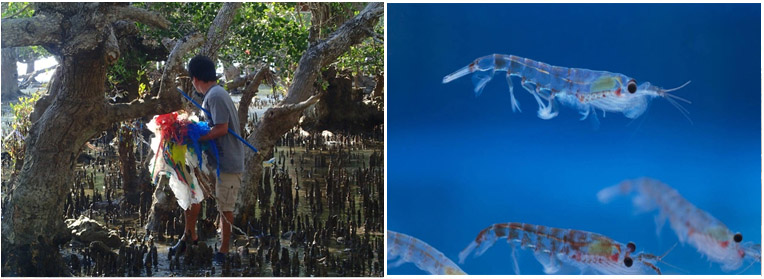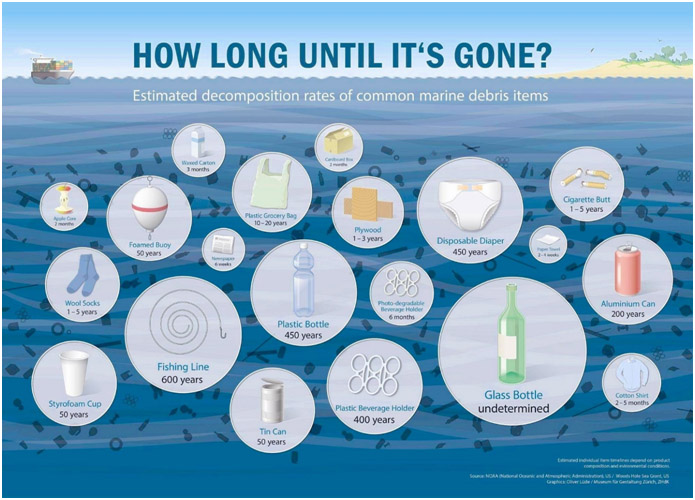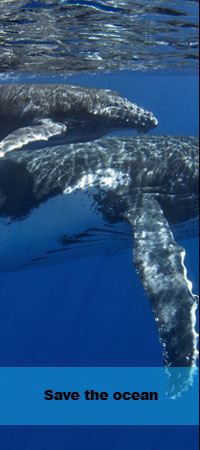|
The ocean has become one giant refuse bin for all plastics. Environmental and health concerns associated with plastic pollution are a long recognized international problem started in early 1970s. Whilst approximately 10% of all solid waste is plastic, up to 80% of the waste that accumulates on land, shorelines, the ocean surface, or seabed is plastic. At current rates, plastic is expected to outweigh all the fish in the sea by 2050. Five countries in Asia (China, Indonesia, the Philippines, Thailand and Vietnam) are estimated to account for as much as 60% of the plastic waste entering the Ocean. During our net tows conducted in the Pacific Ocean in 2017, our results showed that 100% of surface plankton contained buoyant plastic pieces, typically millimeters or smaller in size. Microplastics are everywhere in the ocean including bounded to sea salt and inside fish. Sea salt around the world has been contaminated by plastic pollution, so now microplastics are becoming ubiquitous in the environment and finding their way into the food chain via the salt in our diets.
Single-use plastics such as water bottles are the majority of plastic waste found in the ocean. Up to 12.7 million tons of plastic enters the world’s oceans every year, equivalent to dumping one garbage truck of plastic per minute into the world’s ocean.
Plastics don’t biodegrade. Through photodegradation and abrasion, plastics only break into smaller and smaller pieces and then are consumed by the smallest marine life at the base of the food web. Saline marine environments and the cooling effect of the sea mean that degradation requires very long exposure times. Persistence of plastic debris is poignantly illustrated in the account that plastic swallowed by an albatross had originated from a plane shot down 60 years prior some 9,600 km away!
The impacts on ocean wildlife is enormous. The bodies of almost all marine species, ranging in size from plankton to marine mammals, and including some of the wildest and most vulnerable species on the planet – animals that make nearly their entire living far from humans – now contain plastic. Over 300 species including invertebrates, turtles, fish, seabirds, mammals, have been reported to ingest or become entangled in plastic debris, resulting in impaired movement and feeding, reduced reproductive output, lacerations, ulcers, and death.

Photo on the left: ESI staff removing plastics along mangrove forest. Photo on the right: Research has shown that Antarctic krill
eat microplastics.
Our work against plastic pollution
Endangered Species International (ESI) is addressing this enormous problem at multiple fronts. ESI focuses upon three basic and effective approaches: Remove, Educate, and Enforce existing laws in the five countries in Asia where most plastics are released in the ocean.
Remove. Beach and ocean cleanups are a great way to raise awareness and to collect large quantity of plastic debris on shorelines. In 2017, we removed 100 tons (22,000 pounds) of plastic debris, mostly along mangrove habitat and coastal lines. Our ocean cleanups are accomplished with strong involvement with local communities.
Educate. We conduct plastic pollution awareness program at all levels of local communities where we work. In 2017, we reached directly 200,000 people. In all field project sites, we educate and support communities to transition away from a linear (use and dispose) economy towards a circular economy where resources, such as plastics, are used, recovered and reused over and over again, instead of heading directly to the landfill or the ocean.
Enforce. Most countries have already laws prohibiting the use of plastic bags and ocean pollution. However, laws are not enforced (e.g., Indonesia and the Philippines), therefore plastic debris end up in the ocean. We support local enforcement towards the prohibition of the use, distribution, and sale of single-use plastic. In the United States, we want to regulate plastics as a pollutant under the Clean Water Act and will keep pushing for plastic pollution to be treated as the hazardous waste. Further, we must stop large corporations (e.g., Starbucks) generating enormous non-biodegradable waste.
There is still a lot of work to do, but we are committed to the long struggle to reduce ocean plastic pollution and save marine life.
How you can help
Join us For example, by donating $20, we will remove 220 pounds (100 kilograms) of plastic debris. With your support, each year we will keep removing large amount of floating plastics and dispose them properly for their reuse when possible, saving the life of marine wildlife; Avoid plastic-bottled beverages; Buy products with minimal or reusable packaging; Buy in bulk whenever possible to reduce packaging; Buy and exchange used items; Seek out reusable shopping bags; For coffee and tea, bring your own mug; For food, bring your own container and avoid shopping; Support local, regional and nationwide bans on plastic grocery bags; Spread the word. Talk to your family and friends about it.

|











